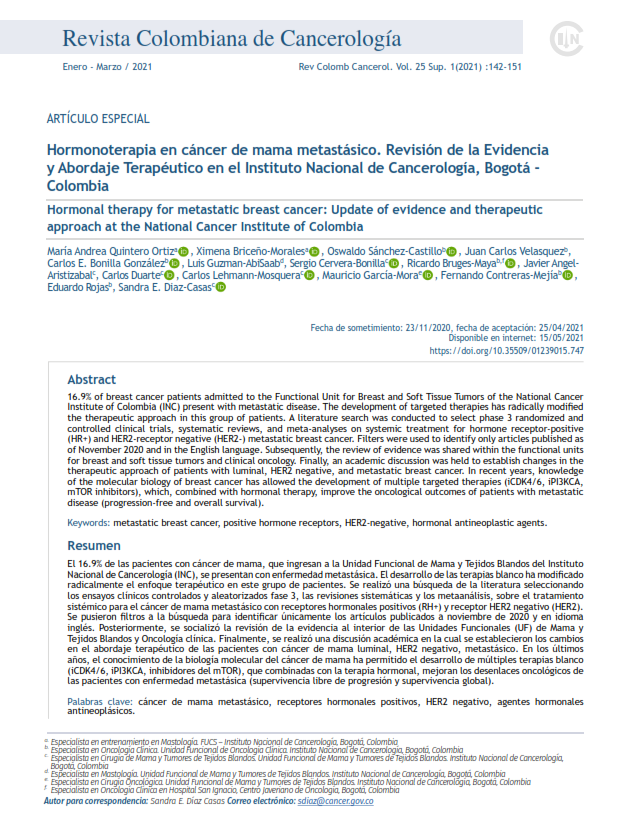Hormonal therapy for metastatic breast cancer: Update of evidence and therapeutic approach at the National Cancer Institute of Colombia
DOI:
https://doi.org/10.35509/01239015.747Keywords:
metastatic breast cancer, positive hormone receptors, HER2-negative, hormonal antineoplastic agentsAbstract
16.9% of breast cancer patients admitted to the Functional Unit for Breast and Soft Tissue Tumors of the National Cancer Institute of Colombia (INC) present with metastatic disease. The development of targeted therapies has radically modified the therapeutic approach in this group of patients. A literature search was conducted to select phase 3 randomized and controlled clinical trials, systematic reviews, and meta-analyses on systemic treatment for hormone receptor-positive (HR+) and HER2-receptor negative (HER2-) metastatic breast cancer. Filters were used to identify only articles published as of November 2020 and in the English language. Subsequently, the review of evidence was shared within the functional units for breast and soft tissue tumors and clinical oncology. Finally, an academic discussion was held to establish changes in the therapeutic approach of patients with luminal, HER2 negative, and metastatic breast cancer. In recent years, knowledge of the molecular biology of breast cancer has allowed the development of multiple targeted therapies (iCDK4/6, iPI3KCA, mTOR inhibitors), which, combined with hormonal therapy, improve the oncological outcomes of patients with metastatic disease (progression-free and overall survival).
References
Díaz-Casas SE, Castilla-Tarra JA, Pena-Torres E, Orozco-Ospino M, Mendoza-Diaz S, Nuñez-Lemus M, et al. Pathological Response to Neoadjuvant Chemotherapy and the Molecular Classification of Locally Advanced Breast Cancer in a Latin American Cohort. Oncologist. 2019;24(12):1360–70. https://doi.org/10.1634/theoncologist.2019-0300
Pan H, Gray R, Braybrooke J, Davies C, Taylor C, McGale P, et al. 20-Year Risks of Breast-Cancer Recurrence After Stopping Endocrine Therapy At 5 Years. N Engl J Med. 2017;377(19):1836–46. https://doi.org/10.1056/NEJMoa1701830
Instituto Nacional de Cancerología ESE. Guía de práctica clínica ( GPC ) para la detección temprana , tratamiento integral, seguimiento y rehabilitación del cáncer de mama. Bogotá DC [Internet]. 2013;1–930. Available from: https://www.minsalud.gov.co/sites/rid/1/Guía de Práctica Clínica de Cancer de Mama versión completa.pdf
Sammons S, Shastry M, Dent S, Anders C, Hamilton E. Practical Treatment Strategies and Future Directions After Progression While Receiving CDK4/6 Inhibition and Endocrine Therapy in Advanced HR+/HER2− Breast Cancer. Clin Breast Cancer [Internet]. 2020;20(1):1–11. Available from: https://doi.org/10.1016/j.clbc.2019.06.017
Beaver JA, Park BH. advanced breast cancer Clinical Trial Commentary. 2012;651–7.
Cardoso F, Costa A, Norton L, Senkus E, Aapro M, André F, et al. ESO-ESMO 2nd international consensus guidelines for advanced breast cancer (ABC2). Breast. 2014;23(5):489–502. https://doi.org/10.1016/j.breast.2014.08.009
Cardoso F, Costa A, Norton L, Senkus E, Aapro M, André F, et al. ESO-ESMO 2nd international consensus guidelines for advanced breast cancer (ABC2). Ann Oncol. 2014;25(10):1871–88. https://doi.org/ 10.1093/annonc/mdu385
Spring LM, Wander SA, Andre F, Moy B, Turner NC, Bardia A. Cyclin-dependent kinase 4 and 6 inhibitors for hormone receptor-positive breast cancer: past, present, and future. Lancet [Internet]. 2020;395(10226):817–27. Available from: http://dx.doi.org/10.1016/S0140-6736(20)30165-3
Dickler MN, Tolaney SM, Rugo HS, Cortés J, Diéras V, Patt D, et al. HHS Public Access. 2018;23(17):5218–24.
Finn RS, Martin M, Rugo HS, Jones S, Im SA, Gelmon K, et al. Palbociclib and letrozole in advanced breast cancer. N Engl J Med. 2016;375(20):1925–36. https://doi.org/10.1056/NEJMoa1607303
Hortobagyi GN, Stemmer SM, Burris HA, Yap YS, Sonke GS, PaluchShimon S, et al. Ribociclib as first-line therapy for HR-positive, advanced breast cancer. N Engl J Med. 2016;375(18):1738–48. https://doi.org/10.1056/NEJMoa1609709
Goetz MP, Toi M, Campone M, Trédan O, Bourayou N, Sohn J, et al. MONARCH 3: Abemaciclib as initial therapy for advanced breast cancer. J Clin Oncol. 2017;35(32):3638–46. https://doi. org/10.1200/JCO.2017.75.6155
Hortobagyi GN, Stemmer SM, Burris HA, Yap YS, Sonke GS, Paluch-Shimon S, et al. Updated results from MONALEESA-2, a phase III trial of first-line ribociclib plus letrozole versus placebo plus letrozole in hormone receptor-positive, HER2negative advanced breast cancer. Ann Oncol. 2018;29(7):1541–7. https://doi.org/10.1093/annonc/mdy155
Johnston S, Martin M, Di Leo A, Im SA, Awada A, Forrester T, et al. MONARCH 3 final PFS: a randomized study of abemaciclib as initial therapy for advanced breast cancer. npj Breast Cancer. 2019;5(1):1–8. https://doi.org/ 10.1038/s41523-018-0097-z
Im SA, Lu YS, Bardia A, Harbeck N, Colleoni M, Franke F, et al. Overall survival with ribociclib plus endocrine therapy in breast cancer. N Engl J Med. 2019;381(4):307–16. https://doi.org/10.1056/NEJMoa1903765
Tripathy D, Im SA, Colleoni M, Franke F, Bardia A, Harbeck N, et al. Ribociclib plus endocrine therapy for premenopausal women with hormone-receptor-positive, advanced breast cancer (MONALEESA-7): a randomised phase 3 trial. Lancet Oncol [Internet]. 2018;19(7):904–15. Available from: http://dx.doi.org/10.1016/S1470-2045(18)30292-4
Turner NC, Ro J, André F, Loi S, Verma S, Iwata H, et al. Palbociclib in hormone-receptor-positive advanced breast cancer. N Engl J Med. 2015;373(3):209–19. https://doi.org/10.1056/NEJMoa1505270
Slamon DJ, Neven P, Chia S, Fasching PA, De Laurentiis M, Im SA, et al. Phase III randomized study of ribociclib and fulvestrant in hormone receptor-positive, human epidermal growth factor receptor 2-negative advanced breast cancer: MONALEESA-3. J Clin Oncol. 2018;36(24):2465–72. https://doi.org/ 10.1200/JCO.2018.78.9909
Sledge GW, Toi M, Neven P, Sohn J, Inoue K, Pivot X, et al. MONARCH 2: Abemaciclib in combination with fulvestrant in women with HR+/HER2-advanced breast cancer who had progressed while receiving endocrine therapy. J Clin Oncol. 2017;35(25):2875–84. https://doi.org/10.1200/JCO.2017.73.7585
Turner NC, Slamon DJ, Ro J, Bondarenko I, Im SA, Masuda N, et al. Overall survival with palbociclib and fulvestrant in advanced breast cancer. N Engl J Med. 2018;379(20):1926–36. https://doi.org/10.1056/NEJMoa1810527
Slamon DJ, Neven P, Chia S, Fasching PA, De Laurentiis M, Im SA, et al. Overall survival with ribociclib plus fulvestrant in advanced breast cancer. N Engl J Med. 2020;382(6):514–24. https://doi.org/10.1056/NEJMoa1911149
Sledge GW, Toi M, Neven P, Sohn J, Inoue K, Pivot X, et al. The Effect of Abemaciclib Plus Fulvestrant on Overall Survival in Hormone Receptor-Positive, ERBB2-Negative Breast Cancer That Progressed on Endocrine Therapy - MONARCH 2: A Randomized Clinical Trial. JAMA Oncol. 2020;6(1):116–24. https://doi.org/10.1001/jamaoncol.2019.4782
Gao JJ, Cheng J, Bloomquist E, Sanchez J, Wedam SB, Singh H, et al. CDK4/6 inhibitor treatment for patients with hormone receptor-positive, HER2-negative, advanced or metastatic breast cancer: a US Food and Drug Administration pooled analysis. Lancet Oncol. 2020;21(2):250–60. https://doi.org/10.1016/S1470-2045(19)30804-6
Robertson JFR, Bondarenko IM, Trishkina E, Dvorkin M, Panasci L, Manikhas A, et al. Fulvestrant 500 mg versus anastrozole 1 mg for hormone receptor-positive advanced breast cancer (FALCON): an international, randomised, double-blind, phase 3 trial. Lancet [Internet]. 2016;388(10063):2997–3005. Available from: http://dx.doi.org/10.1016/S0140-6736(16)32389-3
André F, Ciruelos E, Rubovszky G, Campone M, Loibl S, Rugo HS, et al. Alpelisib for PIK3CA-mutated, hormone receptor-positive advanced breast cancer. N Engl J Med. 2019;380(20):1929–40. https://doi.org/10.1056/NEJMoa1813904
Xi J, Ma CX. Sequencing Endocrine Therapy for Metastatic Breast Cancer: What Do We Do After Disease Progression on a CDK4/6 Inhibitor? Curr Oncol Rep. 2020;22(6). https://doi.org/10.1007/s11912-020-00917-8
Piccart M, Hortobagyi GN, Campone M, Pritchard KI, Lebrun F, Ito Y, et al. Everolimus plus exemestane for hormonereceptor- positive, human epidermal growth factor receptor-2-negative advanced breast cancer: Overall survival results from BOLERO-2. Ann Oncol. 2014;25(12):2357–62. https://doi.org/10.1093/annonc/mdu456
Kornblum N, Zhao F, Manola J, Klein P, Ramaswamy B, Brufsky A, et al. Randomized phase II trial of fulvestrant plus everolimus or placebo in postmenopausal women with hormone receptorpositive, human epidermal growth factor receptor 2-negative metastatic breast cancer resistant to aromatase inhibitor therapy: Results of PrE. J Clin Oncol. 2018;36(16):1556–63. https://doi.org/10.1200/JCO.2017.76.9331
How to Cite
Downloads

Downloads
Published
Issue
Section
License
Todos los derechos reservados.




